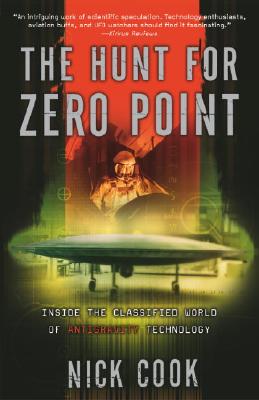

| THE HUNT FOR ZERO POINT Inside the Classified World of Antigravity Technology Nick Cook New York: Random House, 2001 |
Rating: 3.5 Fair |
|||
| ISBN-13 978-0-7679-0628-9 | ||||
| ISBN 0-7679-0628-4 | 291p. | SC/BWI | $14.95 | |
Take some of today's cutting-edge-science topics. Mix well with efforts to get at the details of U.S. military black projects. Pour over a finely parsed layer of Nazi superweapons technology. Bake for two years in a moderately hot oven. Remove from oven. Sprinkle a handful of pseudoscience (or what appears to be pseudoscience) over the top.
This should be the recipe for a gripping tale of investigation, with perhaps some espionage and even a bit of danger to add spice. And Nick Cook, aviation editor for the prestigious British Jane's Defense Weekly, does deliver an engrossing story as he relates his efforts to get to grips with the truth or falsehood of hints that antigravity exists and is being covertly worked on by various units of the American military establishment. Aided by several experts to whom in the book he assigns pseudonyms, Cook travels the world to visit American aerospace centers and private individuals. His quest ultimately leads him to eastern Europe. There, amid the remnants of Hitler's Third Reich, he uncovers truly startling evidence that the Nazi scientists were developing, not just superweapons, but concepts so radical that they would turn contemporary science on its head.
Unfortunately, Cook himself has a poor grasp of science. He makes several false statements in the book (and only partially incorporates the corrections pointed out by his pseudonymous British expert.) Worse, he completely fails to comprehend how incredible — and incredibly revolutionary — the concepts he's investigating truly are.1 For example, he quotes German documents describing an experimental device he calls The Bell which his British expert suggests was an attempt to build a time machine. But the pièce d'résistance is his trip to Vancouver, Canada, where he visits a maverick tinkerer whose collection of arcane devices is said to be capable of levitation, disruption (making objects fall apart), rendering metals momentarily transparent, and even transmuting elements — but only after the tinkerer spends hours fine-tuning his instruments. Even then, the type of effect produced is unpredictable, manifestations occur infrequently, and those that do occur are seldom confined to the intended target zone. (Oh yes; on at least one occasion, tongues of flame leap up through the concrete floor.) Despite the presence of a skeptic on the American team that evaluates these claims, Cook presents the bizarre events as factual and hints that the loss of the team's report (it was routinely destroyed, he is later told) is evidence of a coverup. This remarkable apparatus, which I call the Hutchinson Levitating Disruptor-Transmuter, allegedly achieves its astounding results on just 0.4 to 4kW of power.2
Nick Cook's quest is admirable, and his research extraordinarily diligent. He writes well, and his book is a page-turner. Nevertheless, it appears that he's been suckered by pseudoscience.3 I am forced to conclude that this book is only a cut above the sort of nonsense von Daniken put out, and is not a reliable guide to what may be expected from science tomorrow. Read it for its insights into the last days of Nazi Germany. The claims or hints of hidden scientific breakthroughs in antigravity, time travel, and zero-point energy are baseless and can be ignored, or read for enjoyment only.

 To contact Chris Winter, send email to this address.
To contact Chris Winter, send email to this address.